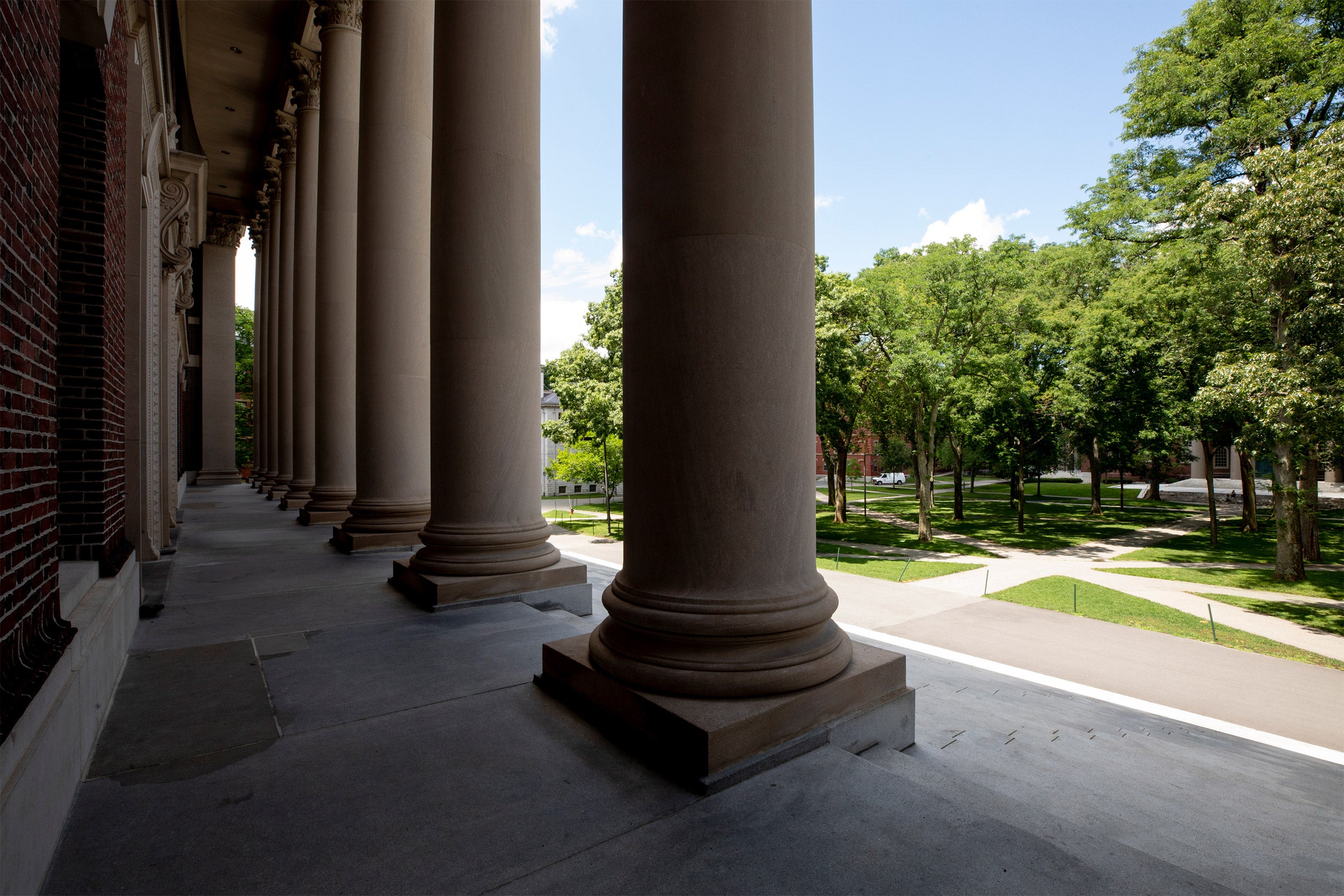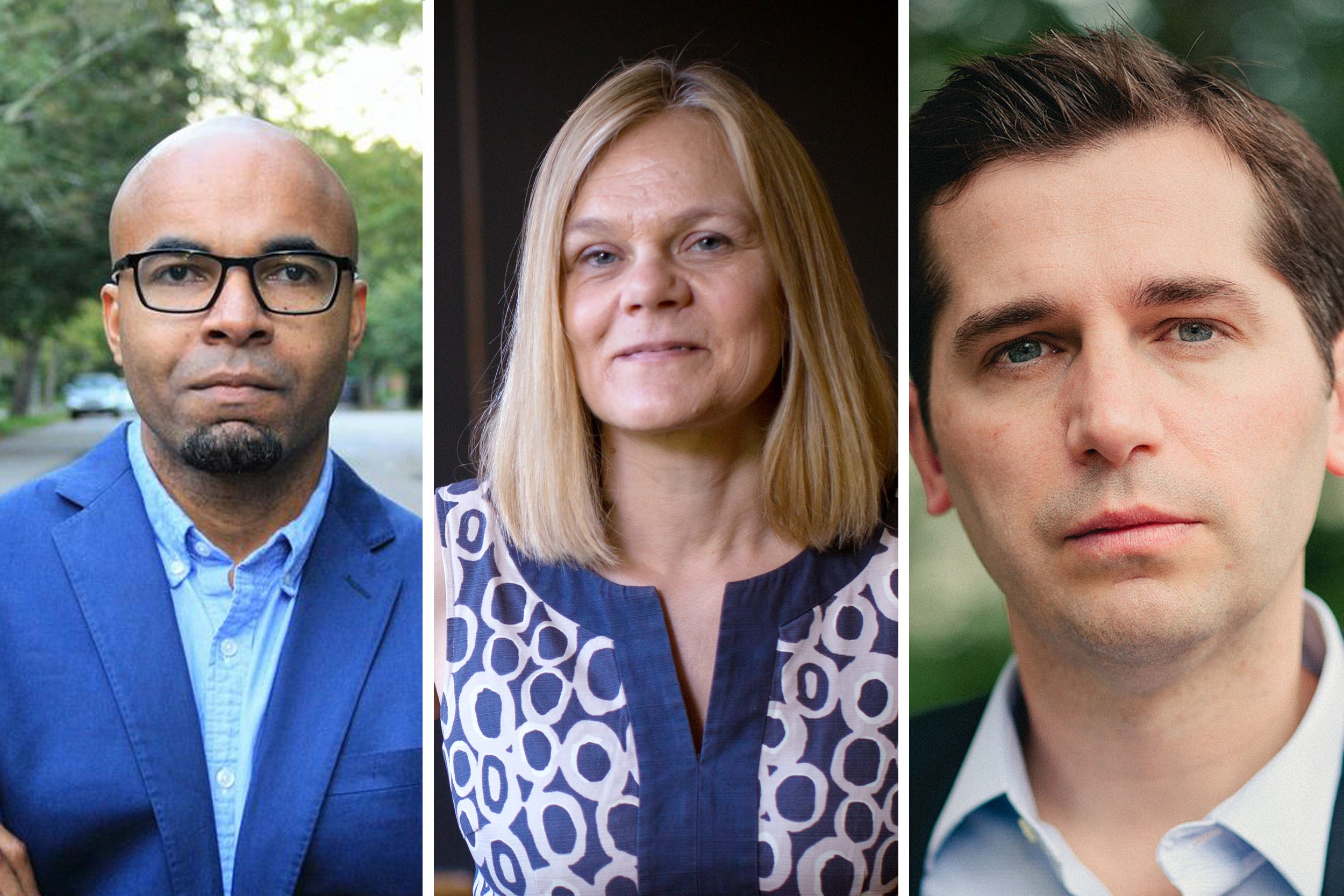
View of Harvard Yard from Widener Library.
Rose Lincoln/Harvard Staff Photographer
Improving emotional wellness for students
Task force offers 8 recommendations for Harvard as issues rise nationally
After completing a 15-month inquiry, a special task force on student mental health this week released eight recommendations for ways the University can improve emotional wellness on campus by addressing a mix of academic, social, and institutional issues.
The Task Force on Managing Student Mental Health was convened by Provost Alan M. Garber in February of 2019 to begin assessing and responding to significant increases in both student self-reports of mental health issues and the subsequent use of related services — upticks that reflected a national trend in higher education.
“The Task Force has thoroughly examined the challenges that our students were facing even before the COVID-19 pandemic upended their lives,” Garber said. “The needs highlighted by this report — for greater connection, for wider adoption of and help with self-care, for more accessible support in dealing with everyday struggles as well as mental health conditions, and for better coordination of mental health strategies across the University — are made even more pressing by the uncertainty and isolation that everyone experiences now. At a time when mental health and well-being demand more of our attention than ever, the report points us toward steps we can take now.”
The Task Force began its work by looking at existing data, gaining a solid understanding of the nature of mental health concerns among Harvard students. The group itself was large, consisting of 46 individuals from across the University’s Schools and units as well as outside experts. And it was diverse, including psychologists, psychiatrists, academics, experts on running institutions, and professionals who provide one-to-one support for students facing mental health issues, undergraduate and graduate students, and faculty members.
“Our investigation confirmed that Harvard students are experiencing rising levels of depression and anxiety disorders, and high and widespread levels of anxiety, depression, loneliness, and other conditions,” wrote co-chairs Mario Small, Emma Dench, and Matt Nock. “In addition, undergraduates reported high levels of stress, overwork, concern about measuring up to peers, and inability to maintain healthy coping strategies. Extracurricular activities, rather than providing unqualified relief, often represented another source of competition and stress. Graduate and professional students reported high levels of isolation, uncertainty about academic and career prospects, and, among those in Ph.D. programs, financial insecurity and concerns about their relation to advisers. Students at all levels reported a lack of clarity about when, how, and where to seek help with potential mental health concerns. The problems we identified were not universal, but were sufficiently widespread to merit action.”
After identifying and describing the scope of issues, the Task Force turned its attention to making suggestions for improvements. And while the project was not conceived as one that would be ongoing, the report points to the need for a continuing study of the community’s evolving needs and the resources necessary to meet them.
The recommendations include:
- Tasking a small team within the Provost’s Office to work on student affairs University-wide. This team would coordinate the implementation of recommendations across the University and facilitate further study of issues where the Task Force was only able to scratch the surface.
- Launching a one-year campaign focused on mental health awareness and culture change, with the goal of cultivating an environment in which students feel encouraged and empowered to care for their mental, physical, and emotional well-being.
- Instituting a yearly messaging program focused on core elements of the first campaign.
- Creating a committee to explore ways to make Counseling and Mental Health Services (CAMHS) more accessible. These would include continuing to examine wait times and recent efforts to ensure a diverse and culturally sensitive counseling staff, while also exploring the potential of digital assessments and interventions.
- Examining how the University can address holistically issues of mental health, sexual climate, inclusiveness, isolation, and sense of belonging.
- Addressing any institutional service gaps that may have been created by recent organizational changes. The Task Force noted the importance of ensuring that CAMHS coordinate closely with the new Academic Resource Center of the Faculty of Arts and Sciences (FAS) to ensure a seamless flow between the two entities.
- Creating a committee in FAS to explore how to reduce the stress caused by the process of competing for entry into extracurricular activities. The report notes that the practice of “comping” for clubs and extracurricular activities emerged throughout its research as a major stressor for undergraduate students. And while some competition may be necessary for certain clubs, there is space for making it less onerous and encouraging the creation of noncompetitive alternatives.
- Providing clear guidance and mentoring support to faculty and graduate students to ease the potential stress caused by adviser-advisee relationships. The report details the importance of these ties to graduate students’ careers and recommends several measures including 1) adopting an advising structure that diffuses power rather than concentrating it with one adviser; 2) clarifying expectations through the development of clear “rights and responsibilities” guidelines and workplace expectations; 3) encouraging mentorship training for faculty; 4) examining how hiring, promotion, and annual evaluation processes can be used to encourage better mentorship; and 5) considering the implications of student financial need for mental health.
The Task Force met as a group for the last time in March. In the intervening months much has changed, including the spread of the COVID-19 pandemic and the events triggered by the death of George Floyd. It is anticipated that these, along with other, as-yet unforeseen events, will continue to alter the landscape of mental health at Harvard, and only increase the need for innovative programming.
“It is clear to us that the dramatic disruptions to social life created by the pandemic will affect, and in some cases worsen, the problems we have identified,” wrote the co-chairs. “Economic stress, high unemployment, social isolation, loss of life, and many other conditions produce grief, stress, loneliness, despair, and more. The University has and must continue to respond, both in the short term and in the long term.” And while the Task Force finished its work prior to the worldwide spread of COVID-19, the co-chairs “believe that our recommendations will prove essential for the University to implement as part of any response, not only to help understand the landscape in which the crisis reached us, but also to inform how to take the steps needed to return to some measure of normality.”
“Our current challenges due to the COVID-19 pandemic further accentuate the role of mental health and well-being in the student experience,” said Harvard University Health Services Executive Director Giang Nguyen. “All of us — students, faculty, and staff — are facing these challenges in different ways; as a community, it is so important for us to support each other, even if we are not in the same physical space. Students from marginalized communities have been hit particularly hard — our BIPOC [Black, indigenous, and people of color], LGBTQ, international, first-gen, low-income, and other minority students will need targeted support. The work of the Task Force is more important than ever.”





